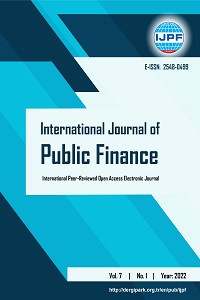Adam Smith'in Vergileme İlkeleri Çerçevesinde Vergiye Gönüllü Uyumun Analizi
Modern maliye anlayışının bir gereği olarak hükümetlerin iktisadi, mali ve sosyal alanlarda görev ve sorumluluklarını yerine getirebilmesi adına ihtiyaç duyduğu gelirin önemli bir bölümü vergiler ile finanse edilmektedir. Hükümetlerin vergilerden beklenen optimum hasılatı sağlayabilmesi, işlevsel bir vergi sistemlerinin oluşması ile mümkün olabilmektedir. İşlevsel bir vergi sistemini oluşturabilmeleri ise vergileme ilkeleri ile yakın ilişki içerisindedir. Nitekim bir vergi sisteminden beklenen faydanın sağlanabilmesi, vergileme ilkelerinin vergi sistemine nüfuz etme derecesi ile ilişkilidir. Vergi sistemlerinin sağlam temeller üzerine inşa edilebilmesinde vergileme ilkeleri önem arz etmekteyken, bu sistemden sağlanacak olan optimum hasılat için vergiye gönüllü uyum önem arz etmektedir. Vergi uyumunun sağlanması dünyadaki tüm ülkelerin vergi ile ilgili en önemli problemleri arasında gelmektedir. Vergi sosyal bir olgu olmakla birlikte, verginin yüklenicisi olan mükellef için psikolojik bir olgudur. Bu bağlamda hükümetlerin, vergi sistemlerini oluştururken vergileme ilkelerine, sistemden optimum hasıla sağlayabilme durumunda ise vergiye gönüllü uyuma önem vermeleri gerekmektedir. Çalışmada Adam Smith’in vergileme ilkeleri kapsamında Kocaeli ilinde vergiye gönüllü uyum analiz edilmiştir. Araştırma sonucunda bireylerin vergiye gönüllü uyum göstermelerini teşvik eden en önemli ilke “iktisadilik ilkesi” iken vergiye karşı gönülsüz tavır sergilemelerini tetikleyen ilke ise “adalet ilkesi” olarak tespit edilmiştir.
Anahtar Kelimeler:
Vergi, vergileme, vergi uyumu, vergileme ilkeleri
Analysis of Voluntary Compliance with Taxes in the Framework of Adam Smith's Taxation Principles
As required by a modern understanding of finance, taxes account for a significant portion of governments' revenues to fulfill their economic, financial, and social duties and responsibilities. Therefore, the establishment of a well-functioning taxation system makes it possible for governments to obtain the expected optimum revenues from taxes. The formation of such a functional taxation system is closely related to taxation principles. In fact, the ability to obtain the expected benefits of a taxation system is linked to the extent to which taxation principles influence the taxation system. While taxation principles are significant for the establishment of taxation systems on a solid basis, voluntary compliance with taxes is crucial for raising the optimal revenue from such a system. Attaining tax compliance is among the most important tax-related problems in all countries in the world. Although taxation is a social phenomenon, it is a psychological phenomenon for the taxpayer who is responsible for taxes. Within this context, governments need to emphasize taxation principles while creating taxation systems and to foreground voluntary tax compliance for the generation of optimum revenues. The present study examines voluntary tax compliance in the province of Kocaeli within the scope of Adam Smith's taxation principles. The study found that the "principle of efficiency" is the most significant canon encouraging individuals to comply with taxes voluntarily whereas the "principle of fairness" triggers reluctance against taxation.
Keywords:
Tax, Taxation, Tax Compliance, Taxation Principles,
___
- Referans 1 Aktan, C.C. (2012), “Vergi Psikolojisinin Temelleri ve Vergi Ahlakı”, Çimento İşveren Dergisi, 1-12.
- Referans 2 Ayyıldız, Y., Vural T. ve Demirli Y. (2014). Vergiye Gönüllü Uyumu Etkileyen Faktörler: “Bolu İli Alan Çalışması”. Bolu: Abant İzzet Baysal Üniversitesi, Yayın No: 2014/1.
- Referans 3 Bornman, M. (2014). Principles For Understanding, Encouraging, and Rewarding Voluntary Tax Compliance. University of Joahnnesburg, Faculty of Economic and Financial Sciences.
- Referans 4 Çimen, G. (2017). “E-Maliye Uygulamalarının Vergilemede İktisadilik İlkesi ve Vergi Uyumuna Etkisi: Tokat İli Muhasebe Meslek Mensupları Üzerine Bir Araştırma”, International Journal of Public Finance, 2(1), 93-108.
- Referans 5 Doyle, E., Gallery, K. ve Coyle M. (2009). “Procedural Justice Principles and Tax Compliance in Ireland: A Preliminary Exploration in the Context of Reminder Letters”, Journal of Finance and Management in Public Services, 8(1), 49-62.
- Referans 6 Edizdoğan, N. (1994). Kamu Maliyesi II, Kamu Gelirleri ve Vergi Teorisi. Bursa: Ekin Kitapevi Yayınları.
- Referans 7 Gökbunar, A.R. (1998). “Vergileme İlkeleri ve Küreselleşme”, Celal Bayar Üniversitesi İİBF Yönetim ve Ekonomi Dergisi, 1(4), 177-201.
- Referans 8 Gökbunar, R. Çetin, G. (2010). “Mükellef Hakları ve Vergiye Gönüllü Uyum: Manisa Merkez İlçe Anket Uygulaması”, Vergi Dünyası Dergisi, 346, 100-113.
- Referans 9 Herschel, F.J. (1978). “Tax Evasion and Measurement in Developing Countries”, Public Finance, 33(3), 232-268.
- Referans 10 Kalaycı, Ş. (2010). SPSS Uygulamalı Çok Değişkenli İstatistik Teknikleri. Ankara: Asil Yayın Dağıtım.
- Referans 11 Kumluca, İ. (2003). “Vergiye Gönüllü Uyumu Etkileyen Faktörler”, Vergi Sorunları Dergisi, 180, 91-97.
- Referans 12 Nadaroğlu, H. (2000). Kamu Maliyesi Teorisi. 11.Baskı. İstanbul: Beta Basın Yayın Dağıtım.
- Referans 13 Pehlivan, O. (2013). Kamu Maliyesi. Trabzon: Celepler Matbaacılık.
- Referans 14 Roth, J.A., Scholz, J.T. ve Witte, A.D. (1989). Taxpayer Compliance Volume 1 An Agenda for Research. Philadelphia: University of Pennsylvania Press.
- Referans 15 Sayar, N. (1975), Kamu Maliyesi Cilt 1, Kamu Gider ve Gelir Prensipleri. İstanbul: İ.İ.T.A Nihat Sayar, Yayın ve Yardım Vakfı Yayınları.
- Referans 16 Silvani, C. Baer, K. (2000). “Vergi İdaresi Reform Stratejisinin Planlanması: Tecrübe ve İlkeler”, Çev: Özgür Saraç, Türk İdare Dergisi, 426, 189-220.
- Referans17 Stark, J.A. Kirchler, E. (2016). “Inheritance Tax Compliance – Earmarking With Normative Value Principles”, International Journal of Sociology and Social Policy, 37, 452-467.
- Referans 18 Şentürk, S.H. (2014). “Vergiye Gönüllü Uyum Sağlanmasında Fayda İlkesinin Rolü”, Eskişehir Osmangazi Üniversitesi İİBF Dergisi, 9(3), 129- 143.
- Referans 19 Tunçer, M. (2001). “Vergi Aflarının Vergi Uyumuna Etkisi”, Uludağ Üniversitesi İktisadi ve İdari Bilimler Fakültesi Dergisi, 1-2 (19), 1-7.
- Referans 20 Turhan, S. (1998). Vergi Teorisi ve Politikası. İstanbul: Filiz Kitapevi.
- Referans 21 Uzgören, N. (2012). Bilimsel Araştırmalarda Kullanılan Temel İstatistiksel Yöntemler ve SPSS Uygulamaları. Bursa: Ekin Yayınevi.
- Referans 22 Wenzel, M. (2002). “The impact of outcome orientation and justice concerns on tax compliance: The role of taxpayers' identity”, Journal of Applied Psychology, 87(4), 629–645.
- Yayın Aralığı: Yılda 2 Sayı
- Başlangıç: 2016
- Yayıncı: Adnan GERÇEK
Sayıdaki Diğer Makaleler
Adam Smith'in Vergileme İlkeleri Çerçevesinde Vergiye Gönüllü Uyumun Analizi
